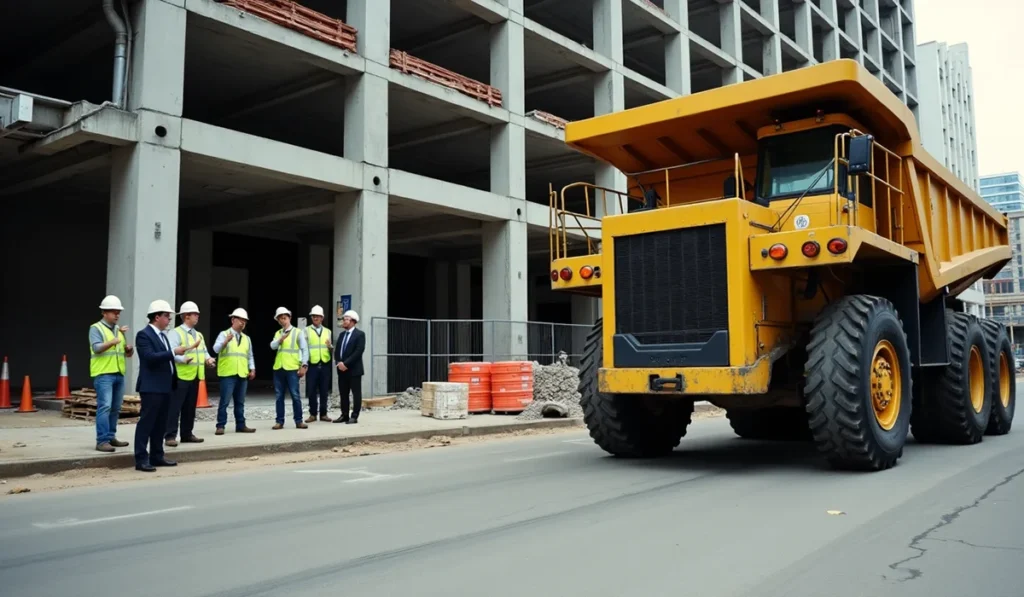Minnesota witnessed its largest construction site death settlement of $8.5 million after a tragic accident claimed the life of 61-year-old Peter Michael Davis. The construction worker met with a fatal accident in downtown St. Paul when a dump truck struck him while reversing almost 70 feet on September 28, 2022.
The worker’s death exposed serious safety violations at the construction site. The dump truck’s backup alarm worked at less than 70% of required specifications. Tests revealed the driver had cocaine and THC in his system after the whole ordeal. This case of fatal negligence prompted unprecedented legal action. The settlement addresses the family’s devastating loss and highlights the urgent need to boost safety standards across the construction industry.
Driver Tests Positive for Multiple Drugs in Fatal Crash
Drug screening after the accident uncovered cocaine and a high THC concentration in the driver’s system[1]. Court documents later revealed that the driver had consumed cannabis products and used cocaine just 24 hours before the deadly crash[2]. The THC level detected raised concerns about the driver’s ability to operate heavy machinery safely.
Construction workers have some of the highest rates of illicit drug use and cannabis use disorder in any occupation[3]. Small companies with less than ten employees face the biggest challenge, with drug use reaching 9.9%[3]. The National Safety Council data shows that substance abuse, including cannabis addiction, affects 15% of construction workers[4].
The driver’s record contained several warning signs. He had refused a reasonable suspicion test in September 2020, which should have kept him away from safety-sensitive work[2]. He took follow-up tests for marijuana and cocaine in December 2022 and April 2023, respectively[2]. The construction company never checked his credentials through the federal Drug and Alcohol Clearinghouse database, even though his status was “prohibited” from driving[2].
Department of Transportation rules require post-accident drug testing of cannabis samples within 32 hours[5]. When drivers test positive for cannabinoids and other substances, courts often presume impairment and extend liability to employers[6]. The construction company’s failure to screen the driver and verify his status through the clearinghouse database exposed a major safety protocol breach.
Court Awards Historic $8.5M Settlement to Family
The family of Peter Davis received a record-breaking $8.5 million settlement from the Minnesota court system in this construction site death case[7]. Recent changes to Minnesota’s wrongful death statute, influenced by evolving attitudes towards marijuana legalization, made this landmark settlement possible by allowing compensation for pain and suffering before death[8].
This unprecedented amount covers both traditional pecuniary losses and damages for Davis’s suffering from impact until death – a first under Minnesota law[9]. After finding serious violations in evidence handling, Judge Mark Ireland sanctioned Ti-Zack Concrete[9]. The company failed to preserve key evidence about the driver’s drug use and didn’t follow the proper protocols for collecting post-accident specimens[9].
Ti-Zack’s failure to maintain federal drug testing protocols, including those overseen by the Drug Enforcement Administration, became a central focus of the court’s decision[10]. The investigation also found that someone had deliberately destroyed the driver’s phone after Davis’s death[9]. Minnesota’s amended statute, which took effect in May 2023, now allows administrators to seek “all damages suffered by the decedent resulting from the injury prior to death” along with traditional pecuniary losses[8].
This settlement creates an important precedent for construction site fatality cases in Minnesota. The courts showed their steadfast dedication to holding companies responsible for workplace safety violations and proper evidence preservation. So this case establishes new benchmarks for both wrongful death compensation and corporate accountability in construction accidents.
Ti-Zack Agrees to Implement Major Safety Reforms
Ti-Zack Concrete’s commitment goes beyond just paying settlements. The company will hire a new safety director to manage detailed workplace safety protocols[9]. This includes implementing stricter cannabis potency monitoring for employees. Research shows that management’s dedication most affects safety performance[11].
The company’s reform package has mandatory safety training programs. All new drivers must watch footage of the Davis incident when they start[9]. This serves as both a powerful reminder and a practical training tool, educating workers about the psychoactive effects and potential memory impairment associated with cannabis use. Research shows that hands-on training improves worker performance and safety awareness by a lot[11].
The management team has promised to strengthen safety protocols with visible support from leadership. They will put in place sound safety management systems, create incident reporting mechanisms, and set up accident information sharing systems[11]. These systems will include regular testing for various forms of cannabis, including cannabis extracts and products used for dabbing. Studies show that when management shows support, employees report more incidents while actual accidents decrease[11].
Construction workers face some of the highest workplace risks, and Ti-Zack’s reforms tackle these challenges head-on. Each year, more than 800 construction workers die and nearly 137,000 get seriously injured on the job[12]. These reforms aim to encourage a culture where workers can report and learn from safety incidents without fear[11], including those related to cannabis use.
Conclusion
A landmark case marked a defining moment for construction site safety in Minnesota. The unprecedented $8.5 million settlement recognized Peter Davis’s tragic loss and highlighted the need for stricter safety protocols in the construction industry. Several safety failures came to light. These included faulty backup alarms and poor drug testing procedures for detecting cannabinoids and terpenes. These discoveries led to complete reforms at Ti-Zack Concrete.
Ti-Zack Concrete promised to put extensive safety measures in place. The company made mandatory incident-based training and stronger protocols a priority to protect workers. These changes will transform safety standards throughout the construction sector where workers face major risks daily, including those associated with the increasing availability of high-potency cannabis from dispensaries.
This case reminds everyone that construction site safety needs constant watchfulness and strict protocol adherence. The settlement created a new legal precedent under Minnesota’s amended wrongful death statute. The message is clear – construction companies must make worker safety their top priority, including addressing the challenges posed by cannabis use, or deal with serious repercussions.
References
[1] – https://www.cbsnews.com/minnesota/news/st-paul-dump-truck-death-lawsuit-settlement/
[3] – https://www.sciencedirect.com/science/article/abs/pii/S0022437512001065
[4] – https://smartlabsnow.com/do-construction-jobs-drug-test/
[5] – https://iprospectcheck.com/post-accident-drug-test/
[7] – https://www.aol.com/family-st-paul-city-worker-184121112.html
[9] – https://finance-commerce.com/2025/02/8-5-million-settlement-reached-in-construction-workers-death/





